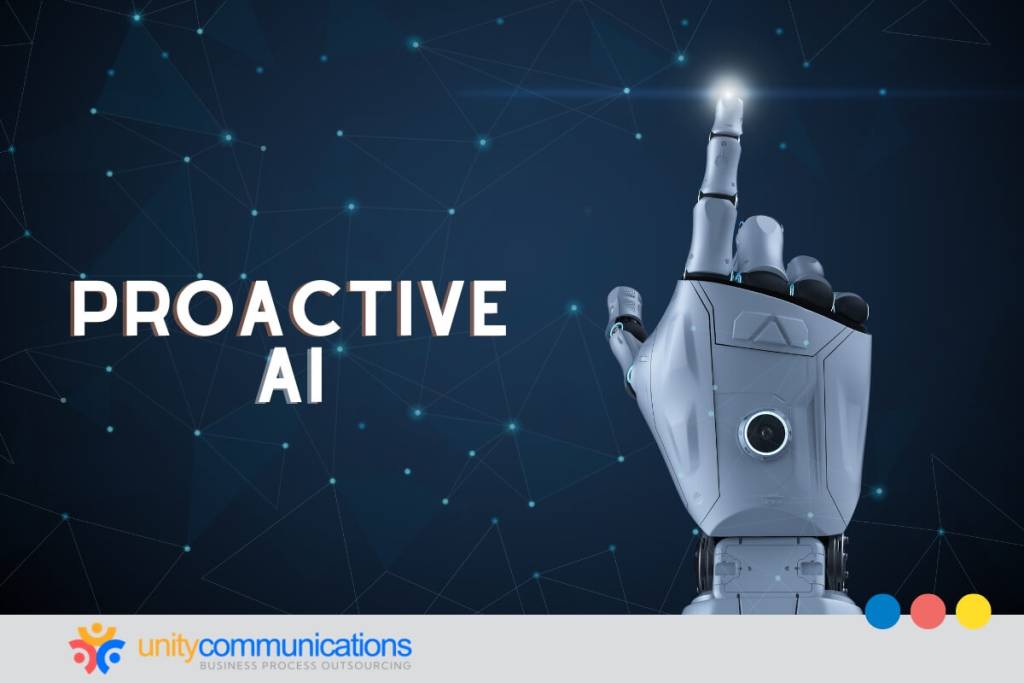IN THIS ARTICLE
Table of Contents
Proactive AI refers to artificial intelligence (AI) systems that identify needs, flag risks, and optimize processes before issues arise. In business process outsourcing (BPO), this technology is changing traditional management by enhancing efficiency, reducing delays, and improving decision-making.
Proactive AI in outsourcing management enables companies to predict operational challenges, automate complex workflows, and ensure seamless service delivery. By leveraging AI-driven insights, businesses can avoid disruptions, maximize productivity, and drive long-term success in outsourcing partnerships.
Let’s explore how proactive AI is redefining the future of outsourcing.
What is proactive AI and why it’s redefining outsourcing management

Before diving into the benefits of proactive AI, let’s answer the following questions: What is BPO, and what is its connection with technology? Business process outsourcing refers to contracting third-party service providers to handle specific roles, such as customer service, IT support, or human resources.
BPO functions are diverse and can include those that benefit from AI integration, such as data entry, payroll processing, and call center operations. The technology can simplify processes, produce more accurate results, and increase productivity without requiring more resources.
However, BPO’s traditional AI systems often react to problems after they occur. Proactive AI in outsourcing management takes a forward-thinking approach. It analyzes vast real-time data to predict inefficiencies, compliance risks, and performance bottlenecks before they harm operations.
This predictive capability allows AI outsourcing companies to optimize workflows, allocate resources efficiently, and enhance service quality. As a result, you can achieve greater agility, cost savings, and improved client satisfaction in their outsourcing partnerships.
Top benefits of using proactive AI in outsourcing success
With 73% of marketers expecting increased competition in 2024, a 19-point jump from the previous year, businesses should become more innovative to stay ahead. Many are turning to AI to fuel creativity and simplify content creation, campaign strategies, and product development.
Its top benefits include the following:
- Improved efficiency. Proactive AI identifies and addresses issues before they arise, minimizing work downtime or disruptions.
- Enhanced accuracy. AI-driven automation reduces human errors, ensuring more precise and consistent outputs.
- Cost savings. Predicting and optimizing inefficiencies lowers operating costs and improves profit margins.
- Faster response times. AI’s predictive capabilities allow outsourcing teams to adapt swiftly to changing conditions and client needs.
- Better customer experience. Proactive AI helps you anticipate and address customer concerns, improving satisfaction and loyalty.
Based on these benefits, incorporating AI in strategic outsourcing can drive substantial improvements in operations, positioning you for greater success. It enhances decision-making, optimizes workflows, and gives you a competitive edge in an increasingly dynamic market.
Real-world application of proactive AI in outsourcing
A September 2024 survey of U.S. business-to-business (B2B) marketers found that around 52% used AI for content creation, 39% for coding, and 35% for presentations. This growing reliance on AI highlights its role in streamlining marketing processes and enhancing productivity.
Proactive AI in outsourcing management is changing marketing through innovative, data-driven decision-making. This growing reliance highlights AI’s ability to streamline complex tasks. In outsourcing, proactive AI is being used in:
- Customer segmentation. AI analyzes customer data to predict trends and segment audiences more effectively for more precise marketing efforts.
- Predictive analytics. Proactive AI anticipates customer behavior so you can tailor campaigns and increase conversion rates.
- Content personalization. AI customizes marketing content based on user preferences for more engaging and relevant messaging.
- Social media management. The technology monitors social media trends and interactions to automate posts, respond to inquiries, and track brand sentiment.
- Campaign optimization. AI evaluates ongoing campaigns in real time and suggests adjustments to improve performance and return on investment (ROI).
Proactive AI transforms marketing efforts to drive better outcomes. It anticipates customer behavior through real-time insights and automation, personalizes interactions at scale, and supports timely, data-backed decisions that amplify campaign effectiveness.
Overcoming the top challenges of integrating AI in outsourcing

Integrating proactive AI into outsourcing processes comes with challenges you should address for successful implementation. An IBM survey showed that 20% of organizations lack employees with the skills to use AI and automation tools, while 16% struggle to find qualified new hires.
Although the benefits are clear, overcoming these obstacles requires strategic planning, investment, and continuous adaptation. The following are common challenges in integrating AI and their solutions:
- Data quality and availability. AI systems require large, accurate datasets to function effectively. Feed clean, organized, and consistently updated data to AI models to generate more precise insights.
- Integration with existing systems. Incorporating AI into current workflows can be complex and time-consuming. Invest in AI solutions compatible with their existing infrastructure or consider phased integration to minimize disruption.
- Lack of skilled workforce. AI’s complexity might require specialized expertise that many organizations lack. Provide ongoing training for the in-house team or partner with AI-focused outsourcing providers to manage the technology.
- Cost of implementation. The upfront investment in AI technology can be significant. Start with small, scalable AI projects that provide an immediate return on investment (ROI) and gradually expand as you see value.
- Resistance to change. Employees or stakeholders might resist adopting AI-driven processes. To ease the transition, foster a culture of innovation, and highlight the technology’s benefits to employees and organizations.
Addressing these challenges can successfully harness the power of proactive AI in outsourcing processes.
Best practices for successful AI implementation
Successful AI implementation requires a well-thought-out strategy and an ongoing commitment to adaptability and improvement. To maximize the technology’s potential, accelerate the smooth integration, and sustain your growth, follow these AI integration best practices:
- Set clear objectives. Define specific goals and outcomes for AI integration to align it with business needs.
- Start slowly. Begin with pilot projects to test AI capabilities and expand based on proven success.
- Ensure data quality. Clean, well-organized, and consistent data produces accurate AI-driven insights.
- Invest in training. Equip the in-house team with skills to work with AI or automation.
- Collaborate with experts. Partner with AI specialists or consultants to gain valuable insights and ensure smooth implementation.
- Monitor and refine. Continuously track AI performance and adjust strategies based on real-time data and feedback.
These strategies set the stage for sustainable success and long-term AI scalability.
Impact of proactive AI on decision-making and problem-solving
Proactive AI enhances BPO decision-making with real-time insights, allowing businesses to address challenges instantly. For instance, an AI-driven support system can detect call surges and reroute inquiries to available agents, preventing service delays.
By continuously monitoring workflows, AI flags inefficiencies and suggests immediate corrective actions, minimizing downtime and improving service quality. Instant feedback empowers managers to make informed decisions without waiting for periodic reports for a more agile operation.
Predictive analytics strengthens BPO management by identifying trends and risks before they disrupt operations. For example, AI can analyze historical data to predict seasonal demand spikes to adjust staffing in advance.
Forecasting outcomes and detecting patterns help organizations tackle bottlenecks and optimize resources. Shifting from reactive to predictive decision-making drives long-term efficiency, innovation, and competitive advantage.
What’s next for AI in outsourcing: 6 trends to anticipate

The future of AI in outsourcing management promises exciting advancements that will further transform how you operate and collaborate with outsourcing partners. As technology evolves, AI will enhance automation, personalization, and operational efficiency. The key trends include:
- Enhanced automation and efficiency. AI will take over routine activities such as posting on social media, managing email campaigns, and optimizing ads, allowing marketers to focus on more strategic tasks.
- Content generation and hyper-personalized experiences. AI-driven tools will help produce marketing content such as blogs, social media updates, and ad copy, increasing the speed and volume of content creation. Marketers can tailor messages and offers to individual customers, improving engagement and boosting conversion rates.
- Advanced data analysis. AI will process large volumes of marketing data to uncover trends, patterns, and insights that humans might overlook for more intelligent decisions. It will also forecast customer actions and market shifts to help you quickly modify strategies.
- Improved customer engagement and experience. Chatbots will provide immediate customer support and respond to inquiries, enhancing satisfaction and allowing human agents to handle complex issues. AI will assess customer feedback and social media conversations to gauge sentiment and identify areas for improvement.
- Increased security and compliance. AI will help identify and stop fraudulent activities, safeguarding your business from potential financial loss. It will help meet data protection regulations, such as the General Data Protection Regulation (GDPR), by automating data anonymization and securing sensitive information.
- Evolution of outsourcing models. AI will help form virtual teams where human marketers collaborate with the technology to boost creativity and efficiency. Outsourcing providers will offer AI-driven marketing services, such as automated content creation, campaign management, and customer service.
AI will further revolutionize the outsourced marketing management industry, improving efficiency, customer experiences, decision-making, adaptability, and overall results.
Ethical considerations in deploying AI in outsourcing
As technology becomes more integrated into outsourcing, proactive AI in outsourcing management includes addressing several ethical considerations to maintain its responsible and fair use. These concerns focus on data privacy, job displacement, and transparency. As AI becomes more embedded in outsourcing, organizations must manage:
- Data privacy. Ensure you collect, store, and use data according to privacy regulations such as GDPR.
- Bias and fairness. AI systems might unintentionally introduce biases, leading to inaccurate and controversial insights that can damage your reputation. Regularly audit your AI systems, use diverse data sets, and involve cross-functional teams for balanced and ethical outcomes.
- Job displacement. Automating human tasks could lead to job losses. To increase employee retention and satisfaction, consider reskilling and upskilling opportunities.
- Transparency. AI decision-making processes should be transparent, allowing stakeholders to understand how you achieved AI-driven outcomes.
- Accountability. Establish clear rules about who is responsible for AI decisions when they affect customers and employees.
Addressing these ethical concerns can build or maintain stakeholder trust and promote responsible AI deployment in outsourcing.
The bottom line
Proactive AI can enhance outsourcing management by predicting problems, automating repetitive tasks, and improving decision-making. Integrating it into operations boosts efficiency, reduces costs, and personalizes customer experiences, ultimately driving better outcomes.
As AI evolves, it is no longer about whether it should be part of your outsourcing strategy but how and where it can make the most meaningful impact. If you’re exploring ways to innovate, stay competitive, and strengthen your outsourcing partnerships, let’s connect to discuss proactive AI solutions for your business.





